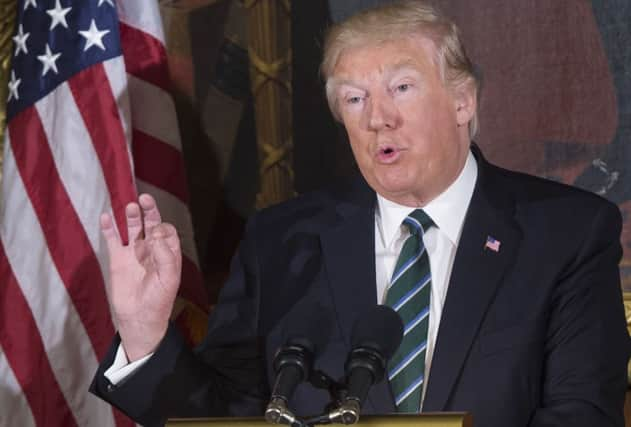US Senate rejects claims Trump Tower was wiretapped


The statement from Richard Burr – a Republican Senator and Senate Intelligence Committee chairman – dismissed Donald Trump’s claim that his telephones were tapped.
Mr Trump had accused his predecessor Barack Obama of wiretapping Trump Tower during the presidential race.
Advertisement
Hide AdAdvertisement
Hide AdMr Burr is one of number of senior politicians who have rejected the allegation.
The news came after President Trump unveiled a $1.15 trillion (£930 billion) budget, proposing a far-reaching overhaul of federal spending that would slash many domestic programmes to finance a big increase for the military and make a down payment on a US-Mexico border wall.
Trump’s plan seeks to upend Washington with cuts to long-promised campaign targets like foreign aid and the Environmental Protection Agency (EPA), as well as strong congressional favourites such as medical research, help for homeless veterans and community development grants.
“A budget that puts America first must make the safety of our people its number one priority – because without safety, there can be no prosperity,” Mr Trump said in a message accompanying his proposed budget that was titled “America First: A Budget Blueprint to Make America Great Again”.
The $54bn (£43.7bn) boost for the military is the largest since President Ronald Reagan’s Pentagon build-up in the 1980s, promising immediate money for troop readiness, the fight against Islamic State militants and procurement of new ships, fighter jets and other weapons.
The 10 per cent Pentagon boost is financed by $54bn in cuts to foreign aid and domestic agencies that had been protected by former President Obama.
The budget goes after the frequent targets of the party’s staunchest conservatives, eliminating the National Endowment for the Arts, legal aid for the poor, low-income heating assistance and the AmeriCorps national service programme established by former President Bill Clinton.
Such programmes were the focus of lengthy battles dating to the Republican takeover of Congress in 1995 and have survived previous attempts to eliminate them.
Advertisement
Hide AdAdvertisement
Hide AdPoliticians will have the final say on Trump’s proposal in the arduous budget process, and many of the cuts will be deemed dead on arrival.
White House budget director Mick Mulvaney acknowledged to reporters that passing the cuts could be an uphill struggle and said the administration would negotiate over replacement cuts.
Mr Mulvaney also went after Republican favourites, including aid to rural schools and health research, while eliminating subsidies for rural air service and the federal flood insurance programme that’s a linchpin for the real estate market, especially in coastal southern states and the Northeast.
Trump’s allies Capitol Hill gave it only grudging praise, if any. “Congress has the power of the purse,” reminded House Appropriations Committee Chairman Rodney Frelinghuysen. “I look forward to reviewing this,” said House Speaker Paul Ryan.
“This is not a take-it-or-leave-it budget,” Mr Mulvaney admitted.
Law enforcement agencies like the FBI would be spared, while the border wall would receive an immediate $1.4bn (£1.13bn) infusion, with another $2.6bn (£2.1bn) planned for the 2018 budget year. Mr Trump repeatedly claimed during the campaign that Mexico would pay for the wall when, in fact, US taxpayers will foot the bill. Twelve of the government’s 15 Cabinet agencies would absorb cuts under the president’s proposal.